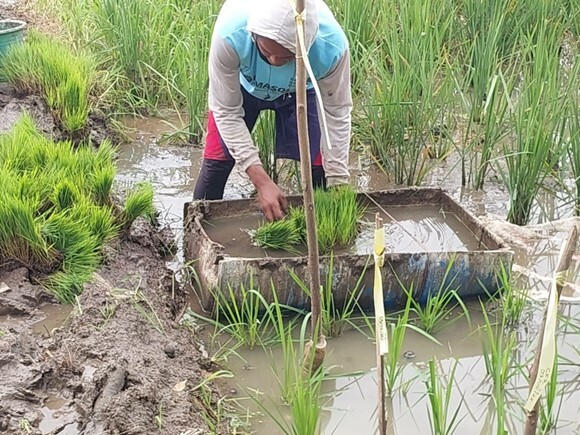📅 2 July 2025

Resistance test of Inpari 32 rice variety utilizing the role of bacteria in salinity-affected land, Blanakan District, Subang Regency — real agricultural adaptation to climate change
High salinity in rice in coastal areas occurs due to excessively high salt levels in the soil or water layers. This affects rice growth and productivity, resulting in stunted growth, resulting in less than optimal rice productivity, and can even lead to crop failure if not addressed promptly and appropriately. High salt levels can inhibit water and nutrient absorption, resulting in osmotic stress in plants. Rice salinity in coastal areas needs to be resolved through the use of bacteria to make rice resistant to salinity. This is what PT. Suryo Riset Indonesia (PT. SRI) is currently developing in Blanakan, Subang, West Java, as well as through a preparation period currently underway in Indramayu Regency, West Java Province.
The rice field area used as a trial location by PT SRI is located in Blanakan District, Subang Regency, with a land area of 3 hectares. In addition to being close to the coast, this rice field area is also located along the Ciasem River which empties into the Java Sea. Its geographical location adjacent to mangrove forests is a measure to prevent abrasion, which is a domino effect of climate change. Overall, the area of rice fields in Subang Regency that experience high salinity reaches around 2,000 hectares, spread across three districts: Blanakan, Legonkulon, and Pusakanagara. In line with this, PT. SRI is preparing a trial development of rice fields affected by salinity in the Indramayu Regency area, which covers a rice field area of 10,000 hectares.
As part of climate change mitigation efforts, agricultural development in this coastal area also involves sustainable agricultural practices that prioritize ecological balance and long-term adaptation to climate change. The synergy between bacterial technology innovation, environmental conservation, and community socio-cultural aspects is expected to create a resilient agricultural system that not only maintains food security but also slows the rate of environmental damage caused by the climate crisis.
Editor: Tim Redaksi PT. SRI
Editor: Divisi Media Sosial PT. SRI
Kami selalu terbuka untuk kolaborasi dengan mitra yang memiliki visi dan semangat yang sama dalam menciptakan inovasi dan solusi berkelanjutan. Bersama, kita bisa mewujudkan proyek yang berdampak positif dan memberikan manfaat nyata bagi banyak pihak. Jangan ragu untuk menghubungi kami dan mulai perjalanan kerja sama yang sukses.